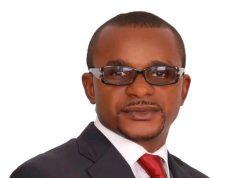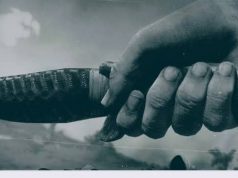
President Muhammadu Buhari
The public perception of President Muhammadu Buhari as a scrupulous anti-graft general appears to be waning because of allegations that his administration is handling some high-profile corruption cases among his top aides with kid gloves.
In the buildup to the 2015 general elections, a major plank of the campaign of the All Progressives Congress (APC) against the Peoples Democratic Party (PDP) government of former President Goodluck Jonathan was that the latter was not only inept, but also irredeemably corrupt.
The APC harped on the integrity of the then General Muhammadu Buhari, a strict disciplinarian and Spartan statesman, whom it presented as the only upright person capable of preventing corruption from crippling Nigeria.
The general himself, by actions and speeches, and especially through the public perception of his persona in the public domain, cut a picture that indicated that with his control of apparatus of government, corruption would not only end in the country but that the war would be fought with determination and without sentiment.
The Special Adviser to the President on Media and Publicity, Femi Adesina, in an article during the celebration of the first 100 days of the government in office, described Buhari as ‘the new Sheriff in town.’
He wrote, “When a new Sheriff comes into town, disorder gives way to order. Chaos flees. Impunity is swept away. Laxity gives way to diligence, and people change their old, unedifying ways. When you have a Wild, Wild West situation prevailing, the new Sheriff comes, and stamps his authority. Old things then pass away, behold, everything becomes new.”
However, more than two and a half years down the line, corruption appears to be taking another dimension as it is pitching some of top aides of the president against one another, creating the impression that the administration lack the will to cage the monster from within its own circle.
With the myriads of accusations and counter accusations by top members of the Buhari administration against each other on matters bordering on graft, a moral issue has been created around the government’s fight against corruption that must be addressed before the 2019 elections.
From all indications, Buhari’s fight against corruption would also form a major plank of campaigns in the next election as it did in the last one and the ability of the APC to convince Nigerians that it had succeeded in the venture, will determine the party’s acceptability.
The current perception however is that nothing concrete has been achieved in that aspect going by the revelations of alleged sharp practices within the government circle and the inability of the administration to bring suspected perpetrators to book.
A look at some instances of corruption cases and how they have been politicised under the incumbent administration showed that when issues of official misconduct are raised against some persons, it easily becomes a case of an official’s words against another and at the end of the day, the substance is lost.
For instance, it took a serious public outcry before President Buhari finally made up his mind to ease former Secretary to the Government of the Federation (SGF), Babachir Lawal out of office. Lawal was accused of awarding contracts to cronies whose firms did not pass the requirements set by law.
Another instance of corruption that stared the government in the face was the arrogance displayed by the suspended Executive Secretary of the National Health Insurance Scheme (NHIS), Prof. Usman Yusuf, when allegations of sharp practices were leveled against him.
In an astonishing response, Yusuf rejected the suspension order slammed on him by the Minister of Health, Prof Isaac Adewole to proceed on suspension for three months following mounting petitions against alleged fraudulent practices and nepotism by some concerned groups.
The letter suspending Yusuf, who hails from the same state as President Buhari, was given to him on July 6, 2017, directed him to go on three months suspension to pave way for an independent probe of the mountains of petitions against him.
Yusuf insisted that the Minister lacks the power to order his suspension. After the acrimony, when the suspension stood, the committee set up by the minister to investigate Yusuf unearthed more facts and as a result heads are still rolling. Eight other officials of the scheme have been suspended over alleged fraud.
In another dramatic case, the altercation between the Minister of State for Petroleum Resources, Dr. Ibe Kachikwu and the Group Managing Director of the Nigerian National Petroleum Corporation (NNPC), Dr. Maikanti Baru, which bordered on non-adherence to due process in the award of NNPC contracts worth $25 billion and acts of insubordination by Baru, also confirmed the skepticisms of those saying the government has lost grip of discipline and steam to tackle corruption.
Despite the manner in which the matter was resolved and Kachikwu and Baru were later seen at a public engagement, not a few people felt that something was fishy and that it should be properly investigated.
Another embarrassing issue of misconduct among Buhari’s aides, which the government would have to clear, is the recent face-of between the Minister of Finance, Ms. Kemi Adeosun and the suspended Director General, Securities and Exchange Commission (SEC), Mounir Gwarzo.
Adeosun had ordered the suspension of Gwarzo following allegations of official misconduct and illegal collection of severance package of N104 million despite contrary advice from SEC’s legal department that he was still in the employment of the commission.
It would be recalled that before Gwarzo was appointed as the Director General of SEC in 2015, he was serving as an Executive Director in the commission. The acting head of the legal department of the commission was said to have objected to the demand of the embattled DG to pay himself severance package on the grounds that such packages were meant for officials who have disengaged from an organisation.
Gwazo was also accused of awarding contracts to companies, one of which is Outward Investment Ltd, a company allegedly controlled by his wife and himself, which has allegedly been supplying diesel to SEC since 2015, whereas another company, Northwind Environmental Services, allegedly controlled by his brother was awarded the contract to clean the commission’s Kano zonal office.
The Minister in an outcry, told journalists that Gwarzo attempted to blackmail her to douse the situation by threatening to leak a memo to the media.
Noting that Gwazo breached official procedures and protocol for mails delivery in her office, by delivering a memo to her through the SEC staff seconded to her office, Adeosun said: “The copy of the memo was delivered in a sealed envelope with a message that any action against Mr. Gwarzo would result in same (the memo) being leaked to the press.”
Other cases of graft currently affecting the Buhari administration’s image include that of the embarrassing reinstatement of former chairman of the Presidential Pension Task Team, Abdulrasheed Maina into the Civil Service.
Although, the Minister of Justice and Attorney General of the Federation, Abubakar Malami, denied knowledge of any letter reinstating Maina, the Head of Service of the Federation, Mrs. Winfred Oyo Ita, insisted that there were letters from the AGF to the Federal Civil Service Commission (FCSC), directing Maina’s reinstatement while the Minister of Interior, Lt. General Abdurahman Dambazau (rtd), denied having any hand in the matter.
Similarly, there are still question the government has not addressed on the $43 million dollars cash found in Osborne Towers, Ikoyi Lagos last April. The money has raised a lot of controversies and allegations and counter allegations among government officials but the Director General of the National Intelligence Agency (NIA), Mr. Ayo Oke, who was indicted over the matter and was recently relieved of his job, is yet to be prosecuted.
Attempts by the Economic and Financial Crime Commission (EFCC) to arrest Oke was prevented by operatives of the NIA, a development that raised questions on inter-agency cooperation’s and ability of the Buhari administration to provide firm leadership.
With these disturbing trend, which analysts believe has already thrown spanner into the anti graft war of the administration and which opposition politicians are beginning to capitalise on to hang a corrupt tag on the neck of government, some drastic measures have to be taken to bring the fight back into focus.
But the Minister of Information and Culture, Alhaji Lai Mohammed said the fight against graft is not Buhari’s fight, neither is it APC’s but that of the whole country which means that all Nigerians must identify with it if the war must be won.
Mohammed, who defended the government at the launch of the Anti-Corruption Situation Room (ACSR), said the essence was not just to promote transparency and accountability in government but also to ensure that the people take ownership of the fight against corruption.
While assuring that the Buhari administration has no sacred cow, the Minister said unless there is a collaboration that involves the government, the media and other major stakeholders, the fight will be tougher than it should be adding however that the fight is gaining momentum and that government is winning the war even though he agreed that there were challenges.




